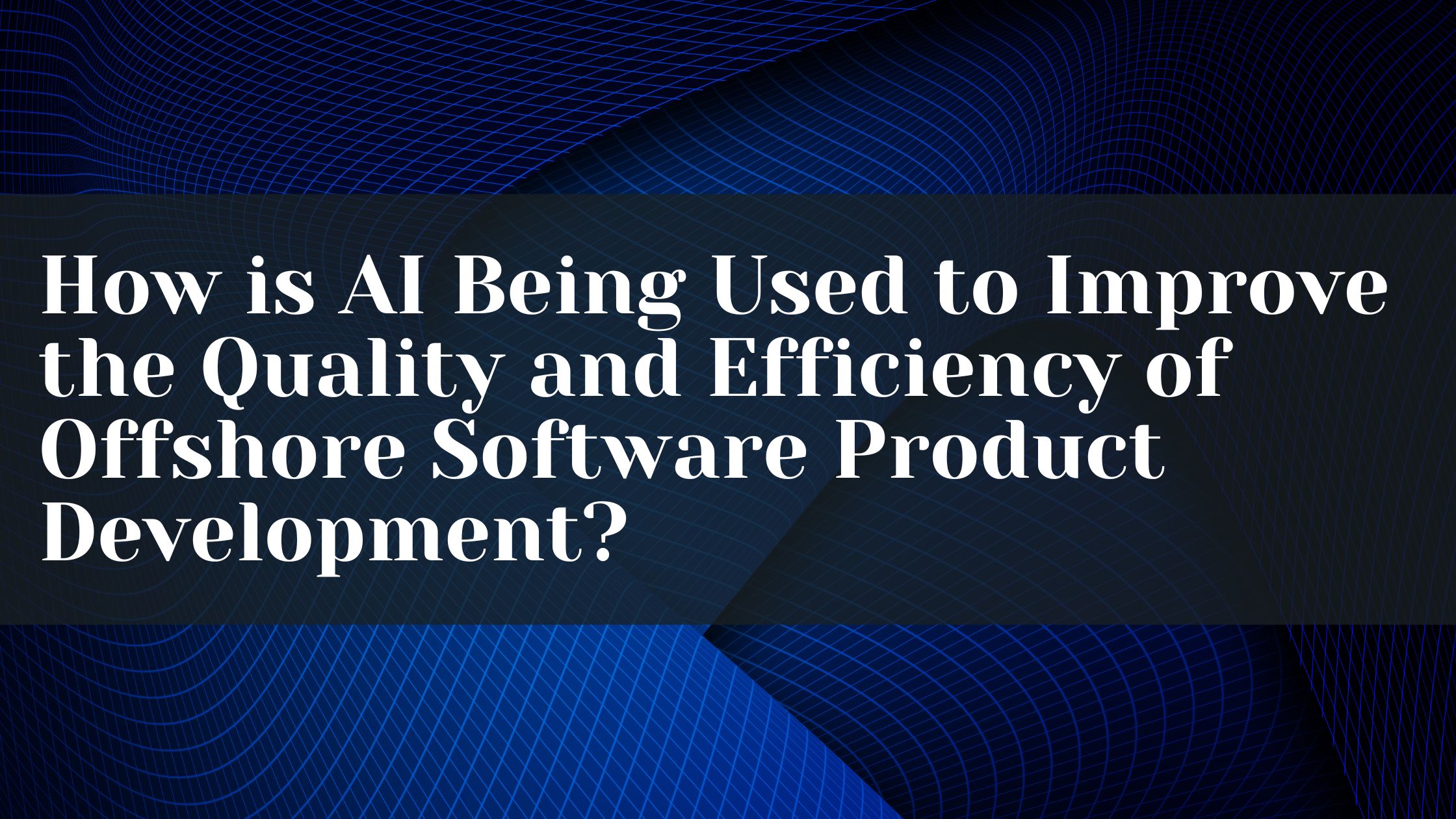
How is AI Being Used to Improve the Quality and Efficiency of Offshore Software Product Development?
Offshore software development has become an integral part of the global tech industry. It enables companies to tap into a vast talent pool, reduce costs, and accelerate development cycles. However, managing remote development teams comes with challenges, including communication barriers, time zone differences, and quality control. This is where AI comes into play, transforming offshore software product development by enhancing its quality and efficiency. In this blog, we will explore how AI is used to enhance the quality & efficiency of offshore product development services.
How to Improve Quality & Efficiency of Offshore Software Development?
1. Predictive Analytics for Team Performance
Managing offshore development teams can be challenging due to the need for physical proximity. AI-powered predictive analytics can help in assessing and predicting the performance of remote teams. By analyzing historical data, AI can provide insights into the performance of offshore teams. It enables project managers to allocate resources more effectively and make informed decisions about team composition.
Moreover, predictive analytics can identify potential roadblocks early in the development process. For example, if the data suggests that a team needs to catch up, project managers can take proactive measures.
2. Automated Code Review and Quality Assurance
Maintaining code quality is essential for offshore software product development. AI-powered tools can automatically review code for compliance with coding standards, security vulnerabilities, and best practices. These tools can catch issues that might be missed by human reviewers, ensuring a higher level of code quality & security.
Furthermore, AI can help in identifying patterns in code that lead to performance issues or bugs. This proactive approach to quality assurance can save time & resources, as it reduces the need for extensive debugging and rework.
3. Natural Language Processing for Better Communication
Effective communication is a key factor in offshore product development services. AI, particularly Natural Language Processing (NLP), is being used to bridge communication gaps. NLP-powered chatbots and virtual assistants can assist in project management, answering developers’ queries, and even facilitating multilingual communication.
These AI-driven communication tools can translate messages in real-time, making it easier for developers to collaborate. Additionally, NLP can analyze the sentiment in communication to detect potential issues within the team.
4. Automated Testing and Bug Detection
AI has revolutionized the testing and bug detection process in offshore software product development. Automated testing tools powered by AI can create and execute test cases faster and more accurately than manual testing. This results in quicker identification and resolution of defects.
Machine learning algorithms can also help predict where bugs are most likely to occur in the code. It allows developers to focus their testing efforts more effectively. By automating these processes, offshore product development services can reduce the time required for testing and bug-fixing.
5. Code Generation and Accelerated Development
AI-driven code generation tools are becoming increasingly popular in offshore software product development. These tools can generate code snippets, templates, and complete functions based on the developer’s input and project requirements. This speeds up the development process by reducing the amount of manual coding required.
Additionally, AI can analyze existing codebases and suggest improvements or optimizations. This not only saves development time but also ensures that the code is of high quality and performance.
6. Project Risk Assessment
Assessing project risks is a critical aspect of offshore product development services. AI can help identify potential risks by analyzing project parameters, such as team performance, code quality, and external factors.
By predicting & managing risks more effectively, project managers can make informed decisions to mitigate potential issues. This proactive approach is essential for delivering projects on time and within budget.
7. Resource Allocation and Scaling
Managing offshore software product development teams often involves scaling resources up or down based on project requirements. AI can analyze project data and recommend adjustments in real-time. For example, if a project falls behind schedule, AI can suggest adding more developers to the team.
Conversely, when a project nears completion, AI can recommend reducing the team size to optimize resource allocation. This dynamic approach to resource management ensures that projects are adequately staffed without unnecessary overhead.
8. Predictive Maintenance for Infrastructure
Offshore software product development relies heavily on IT infrastructure, and downtime can severely impact project timelines. AI can be used to predict maintenance requirements for infrastructure components, such as servers and network equipment. By analyzing historical data and performance metrics, AI can forecast when hardware might fail or require maintenance.
Predictive maintenance prevents unplanned outages, ensuring uninterrupted infrastructure access and enhancing project efficiency.
9. Data-Driven Decision Making
AI is also instrumental in providing valuable insights for decision-making. By analyzing data from various sources, AI can identify trends and patterns that can inform strategic decisions.
For instance, AI can suggest changes to the development process, tools, or methodologies based on historical data. This data-driven decision-making approach ensures that offshore software development processes are continually optimized for better quality and efficiency.
10. Cybersecurity and Data Protection
Cybersecurity is a top concern in offshore software development, as sensitive data often flows across international boundaries. AI can enhance security by monitoring network traffic for suspicious activities and identifying potential security threats.
Additionally, AI can help in the early detection of data breaches and provide real-time alerts. By bolstering cybersecurity, AI protects valuable project assets and intellectual property.
Conclusion
Artificial Intelligence is revolutionizing offshore software product development by improving quality and efficiency in various ways. AI is crucial in optimizing offshore development processes, from predictive analytics to automated code review, NLP for communication, and resource allocation.
The ability of AI to analyze and process vast amounts makes offshore product development services more agile and effective. As technology advances, we expect AI to play an even more prominent role in shaping the future of offshore development.


